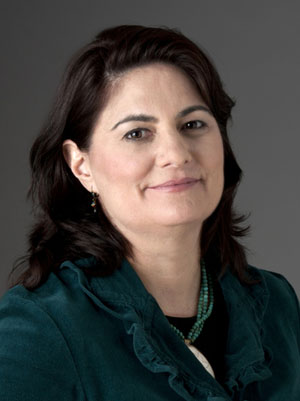As thousands of exhausted survivors from Hurricane Katrina huddled in Houston's Astrodome, Carrie Kahn, a reporter for National Public Radio, noticed a pastor helping refugees into a ratty old van.
The minister told Kahn he was taking people to Sunday service. Kahn decided to tag along, spending the next days reporting the story of how a tiny black church took in as many refugees as it had parishioners: 100 people it fed, clothed, and housed.
"Carrie is more than just a reporter," says the pastor, Ronald Smith of the New Mount Calvary Baptist Church in Houston, remembering how Kahn used her own resources to help reunite a mother with her missing 14-year-old son. "Her heart is in what she does," says Smith. "There's nobody like Carrie."
"Heart" may be how Smith describes Kahn (College Eight '87, biology), now a foreign correspondent for NPR based Mexico City. But listen to Kahn's body of work, and a picture also emerges of a woman who consistently braves tough situations in order to get at the truth.
Kahn has covered stories from modern-day slave farms to the massive earthquake in Haiti to a double-crossing DEA informant and allegations of euthanasia at a New Orleans hospital after hurricane Katrina. For a series on crime and violence in Latin America, Kahn traveled to the world's deadliest city—San Pedro Sula in Honduras—where she ventured into a notorious prison and the area's worst neighborhood in order to delve into the cause of that city's brutality.
Kahn, like all good foreign correspondents, has "boundless curiosity, a passion for new places and people, an eye for detail, a sense of humor, and the tenacity to keep asking questions and running down leads to get the most accurate, honest, and impartial version possible," says Didrik Schanche, deputy international editor for NPR.
"I like being in the middle of things and taking people to an event, being the eyes and ears for them," says Kahn, whose familiar voice fills a telephone interview. "My job is challenging and exhausting sometimes, but I also think it's an important role as we lose more and more of that first-person reporting."
Kahn, 50, didn't start out to be an award-winning journalist. At UCSC, she planned to become a research scientist. But after working in a genetics lab in Central America and watching civil war rage in Guatemala and the Iran-Contra scandal emerge in Nicaragua, her focus changed.
She returned to Santa Cruz, where she worked for the bilingual newspaper El Andar and then got an internship with radio station KUSP. Jobs followed at KPBS in San Diego and KQED in San Francisco, as her journalistic star rose.
It was while working in Los Angeles in 2010 that Kahn saw an early report of a massive earthquake in Haiti. She sent an email to an NPR editor.
"I'll go," she said.
Within hours, Kahn was on a plane, becoming the first NPR reporter inside that ravaged country. She followed doctors as they treated wounded survivors and watched dazed relatives wander through bodies stacked three and four deep outside the city's morgue. She slept outdoors wrapped only in a tablecloth for warmth, and returned six times to report on rebuilding efforts and questions about how the Red Cross and other charities were using the money they had collected.
It's that kind of tough, on-the-ground reporting that has made a name for Kahn but also, she admits, it's what has taken a psychological toll. In order to cope with the tragedy and suffering she witnesses, she does things like raise money for a tiny Haitian school and stays in touch with the people whose stories she has covered—like Pastor Smith at that little Houston church.
"Stuff like that makes me feel better," Kahn says. "I hope I'm not just a journalist who comes in and gets what they want and then leaves."
Now living in Mexico City with her husband, Ramon Beristain; children Isabella, 13, and Mimi, 11; along with a cat named Phebo and a dog named Mona, Kahn is facing the new task of chronicling the economic, educational, and political challenges in a region plagued with poverty, corruption, and drug violence.
Kahn says she doesn't have "any grand illusions of changing the world," but does believe in the importance of exposing corruption, of asking tough questions, and of "holding people's feet to the fire."
"I really believe democracy depends on a free and independent press," Kahn says. "In this time, when the press is becoming very fractured and where newspapers are in great peril, I think it's important there are still reporters out there who have an independent streak and are on the spot doing first-person reporting."



